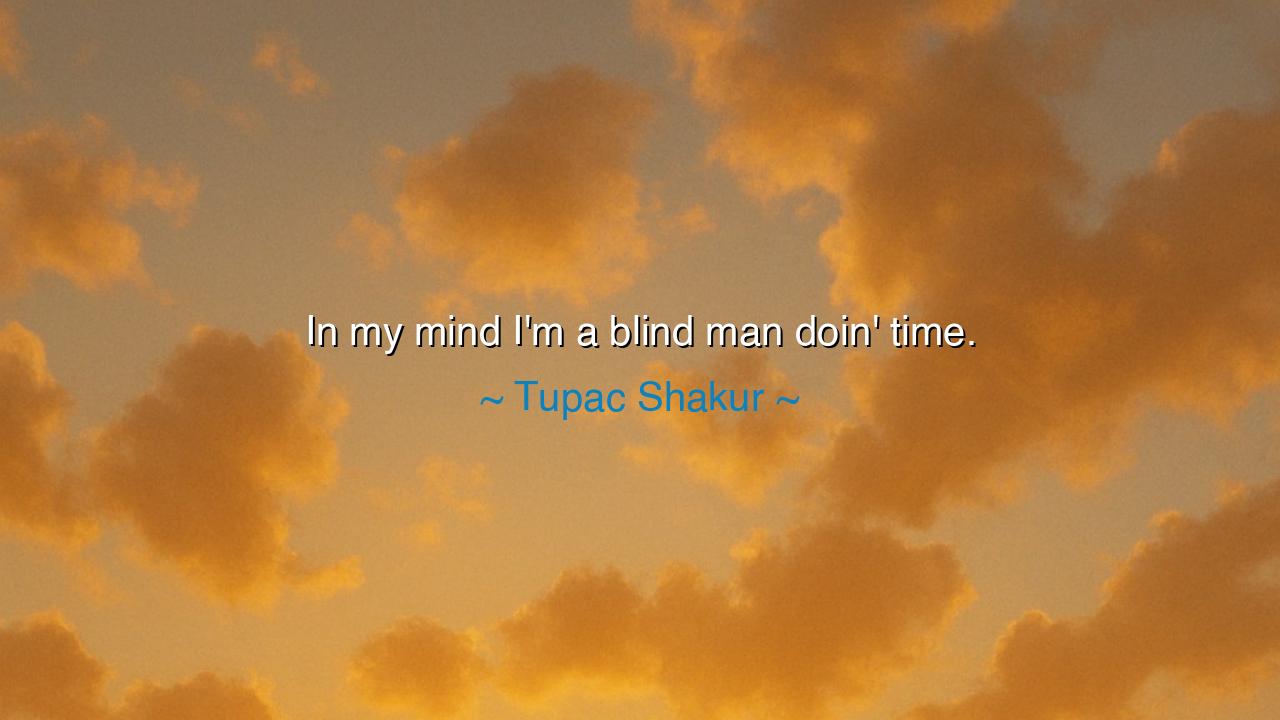
In my mind I'm a blind man doin' time.






The poet-warrior Tupac Shakur once cried out with piercing truth: “In my mind I’m a blind man doin’ time.” These words, wrapped in sorrow and fire, are not the idle musings of a restless spirit, but the lament of a man who bore chains both seen and unseen. For what is blindness of the mind, if not the state of one who walks in darkness, searching for light yet finding only shadows? And what is time in prison, if not the weight of years crushing the soul, reminding him each hour of what is lost? In these words, Tupac speaks not only for himself, but for all who have felt trapped within their own thoughts, cut off from vision, chained by circumstance.
To be blind in the mind is to struggle without clarity, to reach for hope yet stumble upon despair. It is to live in a world of noise without guidance, where the future is veiled and the heart cannot see beyond suffering. To be doin’ time is not merely to sit behind bars, but to carry imprisonment within—the sense that every day is stolen, that every hour passes not toward freedom, but toward exhaustion. Tupac, a man who knew prison both literally and figuratively, captured the torment of the spirit when vision fails and only survival remains.
History gives us many such examples. Recall the story of Galileo, imprisoned not by iron but by decree, condemned for daring to see what others refused. Though his eyes beheld the heavens, his mind was forced into the darkness of silence, forbidden to share truth. He too was a blind man doin’ time, trapped in a world where sight was a crime. Or consider Nelson Mandela, caged for twenty-seven years. Though his eyes saw the bars, his mind refused blindness; he trained his spirit to see beyond the walls. Unlike Tupac’s lament, Mandela’s tale shows the opposite path: how one can choose to hold vision even when the world attempts to blind it.
Tupac’s cry, however, is the cry of the restless soul caught between despair and defiance. He reminds us that the deepest prisons are not always of stone; they may dwell within thought, within memory, within grief. He lived among chaos—poverty, violence, betrayal—and in that furnace his spirit was both sharpened and scarred. His words reveal the pain of one who longed to see a way forward, yet often found himself stumbling in darkness, unable to pierce the veil of his own suffering.
Yet from his lament arises a lesson for us all. We must not let our minds grow blind, even when the world surrounds us with darkness. When time feels like a punishment, when days become chains, we must seek light with greater determination. For blindness of the spirit can be lifted not by eyes, but by courage; imprisonment of the soul can be broken not by keys, but by vision. To see beyond suffering, to imagine freedom even in the midst of confinement, is to reclaim power over time itself.
Therefore, let us live not as blind men doin’ time, but as seekers of vision. When despair surrounds you, pause and look inward. Ask: what truth do I yet refuse to see? What light waits to be uncovered? Do not surrender to blindness; train the soul as Mandela did, as prophets and sages have done, to see hope where others see only walls.
The practical path is this: cultivate clarity each day. In moments of stress, breathe and seek perspective. When anger blinds, step back until vision clears. When despair chains you, remember that time is not your jailer but your teacher. Keep journals, speak truth, nurture dreams—these are torches that light the corridors of the mind. For though the body may be confined by circumstance, the spirit need not be imprisoned.
Thus, hear Tupac’s lament not as defeat, but as warning. To be a blind man doin’ time is to surrender sight to sorrow. But to awaken, to claim vision even in hardship, is to turn prison into school, and suffering into song. Let his cry guide you: refuse blindness, redeem your time, and let your mind see beyond the walls that life sets before you.






AAdministratorAdministrator
Welcome, honored guests. Please leave a comment, we will respond soon